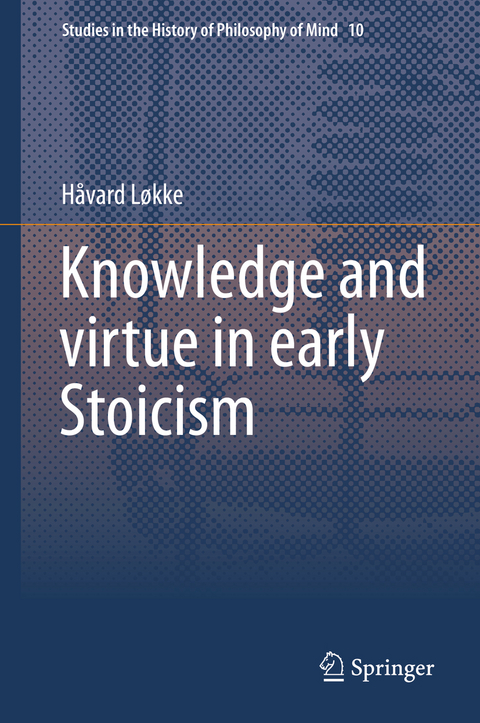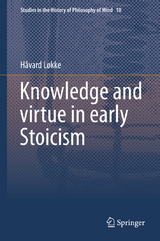Knowledge and virtue in early Stoicism
Seiten
2015
|
1st ed. 2015
Springer (Verlag)
978-94-007-2152-4 (ISBN)
Springer (Verlag)
978-94-007-2152-4 (ISBN)
This book is about the epistemological views and arguments of the early Stoics. He emphasizes how the epistemological views of the Stoics are interrelated among themselves and with views from Stoic physics and logic.
There are a number of Stoic views and arguments that we will never know about.
This book is about the epistemological views and arguments of the early Stoics. It discusses such questions as: How is knowledge possible, and what is it? How do we perceive things and acquire notions of them? Should we rely on arguments? How do we come to make so many mistakes?
The author tries to give a comprehensive and conservative account of Stoic epistemology as a whole as it was developed by Chrysippus. He emphasizes how the epistemological views of the Stoics are interrelated among themselves and with views from Stoic physics and logic.
There are a number of Stoic views and arguments that we will never know about. But there are passages on Stoic epistemology in Sextus Empiricus, Galen, Plutarch, Cicero, and a few others authors. The book is like a big jigsaw puzzle of these scattered pieces of evidence.
There are a number of Stoic views and arguments that we will never know about.
This book is about the epistemological views and arguments of the early Stoics. It discusses such questions as: How is knowledge possible, and what is it? How do we perceive things and acquire notions of them? Should we rely on arguments? How do we come to make so many mistakes?
The author tries to give a comprehensive and conservative account of Stoic epistemology as a whole as it was developed by Chrysippus. He emphasizes how the epistemological views of the Stoics are interrelated among themselves and with views from Stoic physics and logic.
There are a number of Stoic views and arguments that we will never know about. But there are passages on Stoic epistemology in Sextus Empiricus, Galen, Plutarch, Cicero, and a few others authors. The book is like a big jigsaw puzzle of these scattered pieces of evidence.
Håvard Løkke is Associate Professor of Philosophy at the University of Agder, Norway. He wrote his DPhil thesis in Oxford on Stoic epistemology, with Michael Frede as supervisor. He is currently writing a book on love.
Introduction.- 1. From Zeno to Chrysippus.- 2. Nurtured by Nature.- 3. Our thoughts and their objects.- 4. Knowledge and mistakes.- 5. Our progress towards virtue.- 6. From Carneades to Cicero.- Bibliography.
| Erscheint lt. Verlag | 3.11.2015 |
|---|---|
| Reihe/Serie | Studies in the History of Philosophy of Mind ; 10 |
| Zusatzinfo | XI, 149 p. |
| Verlagsort | Dordrecht |
| Sprache | englisch |
| Maße | 155 x 235 mm |
| Themenwelt | Geisteswissenschaften ► Philosophie ► Allgemeines / Lexika |
| Geisteswissenschaften ► Philosophie ► Erkenntnistheorie / Wissenschaftstheorie | |
| Geisteswissenschaften ► Philosophie ► Geschichte der Philosophie | |
| Geisteswissenschaften ► Philosophie ► Philosophie Altertum / Antike | |
| Geisteswissenschaften ► Philosophie ► Philosophie der Neuzeit | |
| Schlagworte | Chrysippus • Stoic epistemology • Stoicism • Stoics • Stoic school |
| ISBN-10 | 94-007-2152-8 / 9400721528 |
| ISBN-13 | 978-94-007-2152-4 / 9789400721524 |
| Zustand | Neuware |
| Haben Sie eine Frage zum Produkt? |
Mehr entdecken
aus dem Bereich
aus dem Bereich
die letzten Jahre der Philosophie und der Beginn einer neuen …
Buch | Hardcover (2024)
Klett-Cotta (Verlag)
CHF 39,20
Gesundheitsschutz, Selbstbestimmungsrechte, Rechtspolitik
Buch | Softcover (2024)
Kohlhammer (Verlag)
CHF 54,60
Jenseits von Identität | Ausgezeichnet mit dem Leipziger Buchpreis …
Buch | Softcover (2023)
Ullstein Taschenbuch Verlag
CHF 19,55




